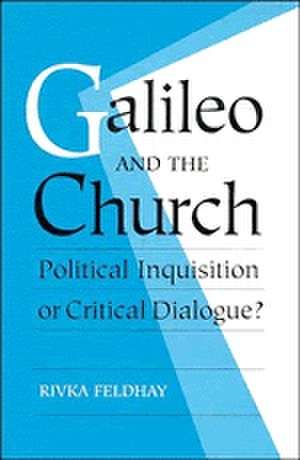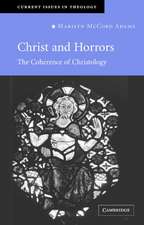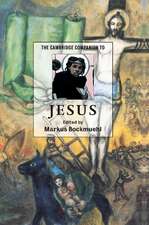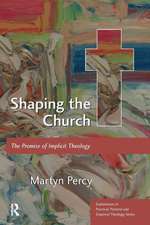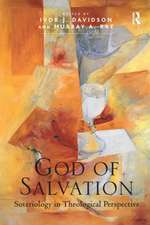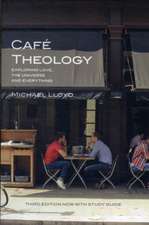Galileo and the Church: Political Inquisition or Critical Dialogue?
Autor Rivka Feldhayen Limba Engleză Hardback – 25 mai 1995
Preț: 696.80 lei
Preț vechi: 782.92 lei
-11% Nou
Puncte Express: 1045
Preț estimativ în valută:
133.34€ • 142.58$ • 111.17£
133.34€ • 142.58$ • 111.17£
Carte tipărită la comandă
Livrare economică 18 aprilie-02 mai
Preluare comenzi: 021 569.72.76
Specificații
ISBN-13: 9780521344685
ISBN-10: 0521344689
Pagini: 316
Dimensiuni: 162 x 237 x 26 mm
Greutate: 0.59 kg
Ediția:New.
Editura: Cambridge University Press
Colecția Cambridge University Press
Locul publicării:New York, United States
ISBN-10: 0521344689
Pagini: 316
Dimensiuni: 162 x 237 x 26 mm
Greutate: 0.59 kg
Ediția:New.
Editura: Cambridge University Press
Colecția Cambridge University Press
Locul publicării:New York, United States
Cuprins
Part I. The 'Trials of Galileo': 1. The Galileo affair: an interpretation of an historical event; 2. 1616; 3. 1633; Part II: The Culture of the Counter Reformation: 4. The Council of Trent: the doctrinarian phase of the Counter Reformation; 5. The Dominicans: a traditional intellectual elite of the Catholic Church; 6. The Jesuits: an alternative intellectual elite; 7. Freedom and authority in Jesuit culture; 8. The Thomist boundaries of Jesuit education; 9. Dominicans and Jesuits: a struggle for theological hegemony; Part III: Galileo and the Church: 10. Traditionalist interpretations of Copernicanism: from an unproven to an unprovable doctrine; 11. Copernicanism and the Jesuits; 12. The cultural field of Galileo and the Jesuits; 13. The dispute on sunspots.
Recenzii
"This book is noteworthy for its original approach to the interpretation of Galileo's trial and for its wealth of information about the ecclesiastical and theological history of the period." Isis
"Feldhay's textual scholarship is careful, her distinctions are finely drawn, and her case is complex....the most original study of the 'Galileo affair' in recent decades....Present-day Jesuits and Dominicans will find much to quibble about here, but they also can learn much from her researches." Theology Studies
"Drawing on original documents and past interpretations, Feldhay looks at the trials of Galileo in a fresh light and comes away with some new conclusions....one of the more interesting and fresh looks at a fascinating political, philosophical and human drama." Gordon Bond, The Practical Observer
"...Feldhay is surely right in placing Galileo in the context of the Dominican-Jesuit struggle for intellectual supremacy in the church, and in suggesting that the Jesuits, who early on had a deep sympathy for Galilean science, were forced by ecclesio-political factors to back away....this book makes an important contribution." Denis Janz, Religious Studies Review
"In this important new study, Rivka Feldhay challenges the predominant scholarly and popular view of the conflict between Galileo and the church....a convincing narrative....In support of the argument, Feldhay provides rich historically nuanced information that allows the reader to see the trajectory of conflicting elite cultures active during the early seventeenth century." James B. South, Canadian Philosophical Review
"It is historically well informed and, in the main, interpretively sensitive in a context where such qualities have often in the past been in short supply." American Historical Review
"Feldhay's textual scholarship is careful, her distinctions are finely drawn, and her case is complex....the most original study of the 'Galileo affair' in recent decades....Present-day Jesuits and Dominicans will find much to quibble about here, but they also can learn much from her researches." Theology Studies
"Drawing on original documents and past interpretations, Feldhay looks at the trials of Galileo in a fresh light and comes away with some new conclusions....one of the more interesting and fresh looks at a fascinating political, philosophical and human drama." Gordon Bond, The Practical Observer
"...Feldhay is surely right in placing Galileo in the context of the Dominican-Jesuit struggle for intellectual supremacy in the church, and in suggesting that the Jesuits, who early on had a deep sympathy for Galilean science, were forced by ecclesio-political factors to back away....this book makes an important contribution." Denis Janz, Religious Studies Review
"In this important new study, Rivka Feldhay challenges the predominant scholarly and popular view of the conflict between Galileo and the church....a convincing narrative....In support of the argument, Feldhay provides rich historically nuanced information that allows the reader to see the trajectory of conflicting elite cultures active during the early seventeenth century." James B. South, Canadian Philosophical Review
"It is historically well informed and, in the main, interpretively sensitive in a context where such qualities have often in the past been in short supply." American Historical Review
Descriere
This book questions the traditional 'grand narratives' of science and religion in the seventeenth century.
